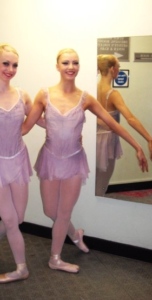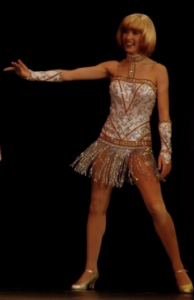Thank you to Sophie Coster for candidly telling her story of how anorexia halted her dancing career and for sending me photos of her to post with her article. She told me that she hopes telling her story will help others.
Sophie’s story:

Sophie at ballet school
At sixteen I was blissfully happy. I was about to train as a professional dancer at Laine Theatre Arts. I had dreams of performing in London’s West End and my scholarship to dance college was my pathway to this. My prediction for my future was that it would look so bright instead I spent seven long years in the depths of anorexia.
At twenty seven I still wouldn’t say I’m fully recovered from anorexia. I’m a lot closer than I was and although I’ll probably never achieve those things I once dreamed of. At least I’m alive. Which is more that can be said for some who succumbed from statistically the most fatal mental illness, anorexia.
Early signs

Early professional work
Although certain signs were present from a young age (perfectionism, self-criticism, body image pressures) I’d always had a healthy relationship with food. It wasn’t until I started my first professional dance job in Japan that I suddenly became more conscious of what I was eating and the effect it would have on my western body, which was proportionally larger than the eastern ideals
Eating disorder misconceptions

Later performing work
However, contrary to what many people may think, eating disorders aren’t just about dieting and wanting to look thin. This is a definite misconception. In fact, when I was at my thinnest I felt most disgusting of all. Eating disorders are incredibly complex and for me it was just a combination of different factors which initiated my downfall. I was desperate to be the perfect dancer, which combined with my belief that if I worked hard then I would succeed. Against this was the lack of control in my life; employment, auditions, which was like a form of punishment, I felt like I wasn’t good enough. I didn’t deserve to eat nice things and I couldn’t afford to relax like the rest of my peers. I had to be disciplined to avoid that crushing guilt I endured if I ‘let myself go.’
Predisposed to anorexia
I found it was one thing having ‘talent’ but without that thick-skinned personality to back it up, or the ability to maintain self-esteem in such a crushing industry, I was bound to fall. Sadly for me it was like a chemical reaction. I was predisposed to such a mentality, so placing myself amongst competition, rejection, blood sweat and tears and constant image pressures was enough to ignite anorexia. Obviously there are thousands of people within the arts who remain very healthy and happy, but I do believe there is a lack of emotional support and training around how to keep a balance in life. Perhaps these teachings are just as important as the physical performance training.
This is all easy to see in hindsight, but I wasn’t really aware of how bad things  became. In fact, when I was dancing on a cruise ship and had lost so much weight that I was barely 5 stone, I was outraged when the ship doctor diagnosed me with anorexia and I was in full denial.
became. In fact, when I was dancing on a cruise ship and had lost so much weight that I was barely 5 stone, I was outraged when the ship doctor diagnosed me with anorexia and I was in full denial.
With treatment I began to embark on recovery. That’s when I realised I was terrified of having to eat and gain weight. I could never have predicted what a battle recovery would be. This included the hatred I felt for putting my family and friends through such stress. The fact that not being able to ‘just eat’ was fuel to the fire. It seemed my desperation to return to dancing and auditions wasn’t even enough to make me ‘recovered’. This shows how powerful the illness can be, as performing was my everything.
Hospitalisation
After various admissions for treatment as a day-patient, and two inpatient hospital admissions lasting over a year, I feel I am starting to see the light. Being in hospital was a tough regime with strict boundaries, and I had to wait four months to even be able to go outside the building. The therapy and groups helped me to understand that I need to change the relationship with myself if I ever wanted to recover. I think those thoughts will always be there but I’m working on being in a place where I am in control of the illness, rather than it being in control of me. Someone described it to me once as though I was possessed. They couldn’t have been more accurate. My life fell apart, I lost my job, friends, my life, perspective and in all honestly I was just desperate not to exist.
Support from family and friends

Sophie today
However, I am incredibly blessed to have a wonderful family and friends who have never given up on me. Even when I have given up on myself they have shown such compassion whilst taking the time to gain invaluable insight into the illness. I have these people to thank for where I am today. I have moved into a new place and I have made the decision to transition into dance teaching which I know is better for my mental health. I just hope that other performers don’t have to experience the same fate, and if counselling, therapy or general support is available then perhaps they won’t ever have to.
The future looks a lot brighter than it once did and I’ll keep choosing recovery everyday so that hopefully one day soon, I’ll be free.
Sophie Coster

Comments are closed.